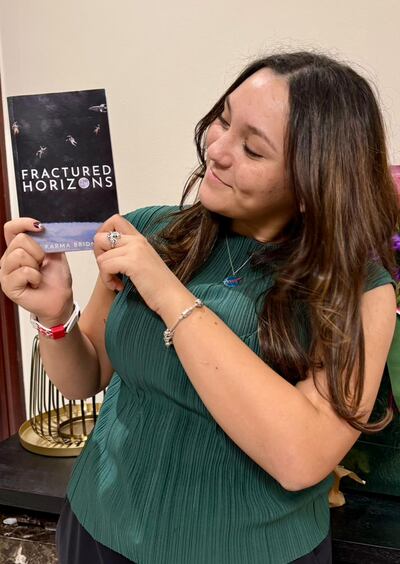Karma Bridgman, 17, an astrophysics student at Dubai College, is already making a name for herself in her field, presenting her classroom work at top institutions including MIT and Cambridge University and capturing the attention of the UAE Space Agency.
The Canadian-Indian is already a self-published author of a science-fiction novel, the lead writer of a research paper that discusses the fate of the universe and a TEDx speaker at her school.
“I'm an aspiring computational astrophysicist and I’ve loved space since I was five years old,” Karma told The National. “As I got older, my interest became more profound, and so my initial delve into astrophysics was writing a 10,000-word dissertation on basic theories in the universe and what we can discover with the power of physics and science.”
Her dissertation was titled Theories for the End of the Universe and supported by mentors at the Canadian Institute of Theoretical Astrophysics. It was her first major work, exploring astrophysics and quantum physics to answer cosmic questions about the fate of the universe.
Building on her dissertation, Karma has since delved into critical issues in modern astrophysics, including particle acceleration and space debris mitigation.

Presenting research at top universities
Her recent research has taken her to some of the world’s most respected institutions. In July, she was invited to present her work on particle acceleration in high-density objects within magnetic and electric fields at the University of Cambridge in the UK, where she addressed an audience that included 10 Nobel laureates.
“I was also selected and invited to present my research at MIT University and Cambridge University in the US at the Undergraduate Research Technology Conference in October," Karma said.
That research was titled Particles in Magnetic Fields: Applications for Space Debris Mitigation. It explores how to track and predict orbits of low-orbit satellites – an exercise that could be crucial in avoiding collisions.
“Space debris is essentially pollution in our orbit,” Karma said. “There are fragments of satellites and other objects moving at incredible speeds, and one collision could disable critical services like GPS for entire regions.
"I presented this work at Cambridge and later at a UAE Space Agency conference. It's one of the ways I’m applying physics to modern problems, rather than purely theoretical ones."
Public speaking has become another way for her to share her research. Last October, she gave a TEDx talk at her school titled Dark Matter: The Light to our Future, exploring one of science's greatest mysterious.
"Dark matter makes up 94 per cent of the universe, but we know almost nothing about it," she said. "It influences everything – from the universe’s shape to its expansion and potential collapse."
Karma's TEDx talk shed light on this unseen force, making the complex topic accessible to a younger audience. For her, it was a chance to combine her scientific insights with a passion for inspiring others.

Balancing work and social life
Despite her many accomplishments, Karma remains a high school pupil with the challenges of balancing academic life, her research and spending time with family and friends.
When not writing research papers or studying for school, she likes spending time with her parents, both of whom are lawyers, and her three sisters.
“Of course, it is quite time consuming but I have multiple hobbies that I love. I play golf and I’m the captain of my golf team at my school,” she said. “I love Lego and I love to build stuff, and I like engineering so I make small gadgets.”
Karma used to enjoy spending time with her elder sister, having been roommates for many years, but she has left to study computational neuroscience at a university abroad.
“I plan to major in both aerospace engineering as well as sustainability, because I think they're equally important,” she said. “And I really love the idea of space exploration, but also using the technologies we develop to help on Earth.”

